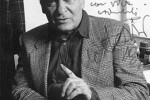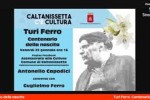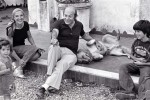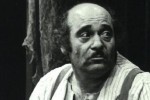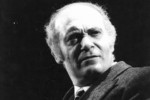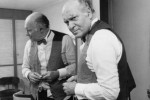2021 (EN)
|
10 January 2021
Tutte le Attività (EN) -
Anno 2021
 Great influx of links and contacts on the multimedia platform of the Museum of Peace - MAMT for the centenary of the birth of Turi Ferro.
Great influx of links and contacts on the multimedia platform of the Museum of Peace - MAMT for the centenary of the birth of Turi Ferro.
President Michele Capasso, in connection with the City of Catania, recalled the "great Sicilian actor naturally linked to the great authors of his Sicily".
Turi Ferro, whose 100th anniversary of his birth on 10 January and 11 May will be the winds of his death in 2001, was above all Pirandello in an exemplary way, managing to bring together, in the ambiguity typical of the great playwright's poetics, his well-known comic qualities with high and dramatic ones playing on times and pauses.
"Usually an actor, during breaks, makes it clear that he is reflecting on a line. Turi did and gave more, an added value - Andrea Camilleri testified - he inserted in his acting certain absolutely comic pauses in a dramatic context, he brought irony, modifying the direction, like any real actor ".
A complete actor, capable of giving life to characters who must arouse laughter, how to move with suffering, to act in Italian as in the Sicilian language, he was also an important character who certainly contributed to the construction of the modern identity of his city, Catania , making the authors and traditional and contemporary texts love, from Verga to Sciascia, but above all creating in 1958 with the best actors of the region, Rosina Anselmi, Michele Abbruzzo, Umberto Spadaro, that cultural center that is still the Teatro Stabile, of which it has been the symbol and soul for over 40 years. And it is the Stabile itself that promotes and coordinates the celebrations for this centenary, with shows, exhibitions, publications, which have been stopped for now by the pandemic.
His skill meant that an actor with natural talent appeared, instinctively, while he was a true professional and each character cost him effort, it was the result of a demanding job always spurred on by questions and doubts in deconstructing and then reconstructing a text, a part. Only then did the literary word find the measure of fiction, that intrinsic musicality that made it a body, turning out to be true, as happens with true art. Born in Catania in the last days of 1920 but registered on January 10, 1921, Salvatore Ferro, known as Turi, begins to act very young, at the Coppola theater in Catania, in the amateur dramatics company, directed by his father Guglielmo Ferro and alongside another Guglielmo , his son, who bears the name of his grandfather, will end his career by having him sign the direction of his latest shows, including a Shakespeare's' Storm 'in which by now eighty was a magical Prospero, a show told in a docufilm by Daniele Gonciaruk' Turi Ferro - The last Prospero 'who extends the investigation to the entire personality of the actor.
On a professional level, Ferro made his debut in 1948 in the Compagnia Rosso di San Secondo in Rome together with Ida Carraro, who came from the Compagnia della Borboni and who would become his wife in 1951. With her, a life and art partner, returned to Catania, he founded the Ente Teatrale Sicilia in 1957 from which the Stabile will come to life the following year, where he made his debut with 'Malia' by Luigi Capuana and then in that 'Liolà' that gave him notoriety, so much so that that vital and sanguine Don Giovanni from the countryside, that all women want and that no one wants to marry, will become one of his war horses for over twenty years.
Since then it has been a succession of shows and tours, even abroad, which include almost all of Pirandello, including some short stories and 'Il fu Mattia Pascal', and many of Sciascia's novels, starting with 'The day of the owl', but this does not prevent him from accepting important calls such as that of Strehler in 1966 who wanted him to be magician Cotrone in the 'Giants of the mountain' and, over the years, many others, ranging from Squarzina to Lavia, to recite classics from Sophocles to Shakespeare, without forgetting Rossellini for Joppolo's 'Carabinieri' at the Spoleto festival in 1962. His successes include numerous theatrical versions of the great Sicilian novels: from 'Mastro don Gesualdo' by Verga, where the scene of death seems to have an emotional intensity, to Brancati's 'Bell'Antonio' and then a classic of Sicilian comedy. 'The air of the continent' by Nino Martoglio, but also a 'Mayor of the Sanità district' by Eduardo.
Cinema has often resorted to him, but he has never managed to give him that prominence that he had in the world of theater, despite counting some good films, from 'A man to burn' by Orsini and the Taviani to 'I knew her well' by Pietrangeli, 'Malizia' and 'Ernesto' by Samperi, 'Mimì metallurgico' by Wertmuller or 'Tu ridi' by Taviani. The same goes for the television career at the time of the great screenplays, remembering above all those born from the novels of Verga, but not only. It should have been Geppetto in Benigni's 'Pinocchio', who remembered him at the moment of his death: "Candid, tragic, humble and tall. He was the Geppetto of my dreams. I will continue to dream of him. He was an actor of stratospheric beauty. his face could inhabit real landscapes and fairy-tale places with the same strength ".


